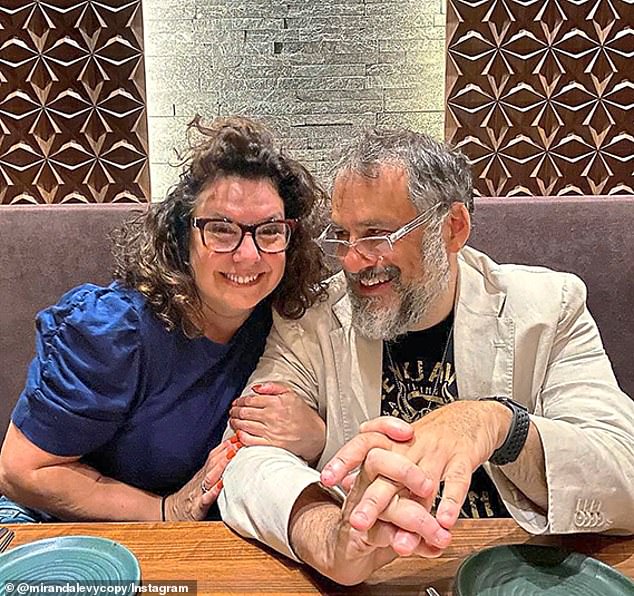Six days before Valentine’s Day – because we hate clichés – Jeremy, my boyfriend of five years, asked me to marry him. It was a non-specific Saturday morning and I was sitting in bed. ‘You know that thing we’ve been talking about me asking you,’ he said. ‘I think it’s time I asked you.’
I last accepted a proposal, from my first husband, at the age of 32. The following year was a whirlwind of florists, caterers and dress-fittings as we planned our country house wedding for 140. This one will be very different.
At the age of 57 (me) and 55 (him), it’s the second time around for both of us and we’ll be joining the 22 per cent of people whom the Office for National Statistics say marry ‘not for the first time’ every year.
When Jeremy and I ‘met’ in June 2019, I was 51 and in the middle of a traumatic divorce, after 18 years of marriage. He was also at the end of a long marriage – he’d been with his wife since high school. We both have two children, ranging from late teens to early 20s.

Miranda with husband-to-be Jeremy. According to a report, ‘couples who marry at an older age are more likely to be “deciders” than “sliders” who fall into the easiest course of action’
I write ‘high school’ because Jeremy is a New Yorker, and ‘met’ because we first encountered one another on what was then Twitter, not the usual place to find lifelong love. I certainly was not looking for it and had no interest in dating.
I was embroiled in an online debate about far-left UK politics and its attitude to Jewish people, which is about as far from romance as it’s possible to get.
When I started getting abuse, Jeremy – who like me is Jewish – stepped in to defend me. I thanked him and we started to chat online, moving swiftly from politics to the books, films and music we liked.
I wasn’t using a profile picture, so he had no idea what I looked like (though he looked cute in his), but we struck up a friendship that deepened and, eventually, Jeremy told me he was flying over to meet me. I told him, don’t be silly. Thankfully, he ignored me and – long story short – we fell in love IRL.
A few days before his visit, I had a spike of panic: I’d put on some weight during my divorce and didn’t want him to get a shock but, from the minute we met at Heathrow, we both felt like this ‘new’ person was our oldest friend and soulmate.
My kids were with their father that week, so we had the flat to ourselves. We spent our time eating out, seeing plays, drinking and kissing. I hadn’t had sex for half a decade and was nervous. (I needn’t have worried: that part turned out to be pretty great.)
His trips gradually became longer in duration. These days Jeremy spends several months a year in the UK, but travels back frequently to see his kids and for his work as a playwright and actor.
When I started chatting to Jeremy I was so bruised from the last years of my miserable first marriage. I felt unconfident and unattractive; getting involved with anyone was the last thing on my mind. But this American man, who laughed at my jokes and listened to my stories, helped my confidence begin to grow.
There’s a joy in the way we can have a sense of humour, where in the past we both took ourselves too seriously. Jeremy and I are noisy and affectionate and, as my daughter says, ‘annoying in exactly the same kind of way’. We tried the ‘opposites attract’ approach in our last marriages with partners who tended to be introverted, and ultimately it didn’t work.
Jeremy and I spend a lot of our time giggling, but on the rare occasions we fall out there are no furious silences: if we’re annoyed or upset, we tell one another. In our previous lives, we had partners with a propensity to simmer: but he and I have it out, then move on. I can count on one hand the fights we’ve had – and it always ends in a hug. Plus, our life experience means we can discuss things openly and without fear of rejection, and our age means we haven’t been bounced into marriage by a ‘biological clock’.
Official statistics appear to support our experience. According to a Marriage Foundation report: ‘Couples who marry at an older age are more likely to be “deciders” than “sliders” who just fall into the easiest course of action.’ The study also states: ‘Where one or both spouses are marrying for the second time there is an estimated 31 per cent risk of divorce, compared to an estimated 45 per cent risk of divorce among couples where both are marrying for the first time.’
We have chosen the ring and are planning a small wedding in the next couple of months for immediate family only. We aren’t exactly sure what form our ceremony is going to take, but I won’t be going full bridezilla over the flowers this time. Jeremy and I love a party, but the black-tie and band were enough first time around. When we eventually tie the knot, it will be about the marriage, not the wedding.











